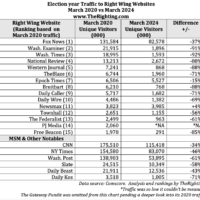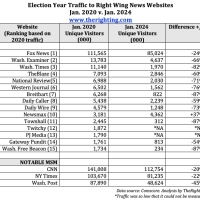
Election “Fraud” Documentary Makes Millions for Conservative Salem Media
By David Lieberman, August 7, 2022
Conspiracy theories may be bad for the country, but they’re damn good for Salem Media Group.
The radio, book, and online company that describes itself as a specialist in “Christian and conservative content” says that as of June 30 it made a $4.8 million profit after recouping its $4.5 million investment in 2,000 Mules, Dinesh D’Souza’s film that claimed to have uncovered fraudulent voting in the 2020 presidential election.
“To say the film has been a success would be an understatement,” CEO David Santrella told Wall Street analysts and investors last week.
Mules made most of its money from sales of DVDs and streams, including on Salem’s SalemNow digital platform. The film has generated only about $1.5 million to date in ticket sales at 415 theaters, according to TheNumbers.com. These revenues are usually divided between the exhibitors and distributor.
More to Come
This was Salem’s first investment in a film. It’s now discussing opportunities to back additional releases that the CEO says “best fit our audience.” He warned, though, that “few films will have the same level of financial performance as 2,000 Mules.”
Still, he talked up Salem’s exclusive distribution agreement for the film Uncle Tom II, to be released August 26. It claimsto show a “Marxist strategy of creating false racial tension between Americans, with its ultimate goal of obtaining power, destroying capitalism and replacing God with government.”
Santrella says that although Salem did not invest in the film “we intend to market the movie to make it as successful as possible given the economics we get for distributing.”
Illogic, Deception and Bad Reviews
D’Souza’s film has been a source of controversy since its premiere in early May, including a private screening at former President Trump’s Mar-a-Lago club. Mules claims that cell phone records show some people voted multiple times in 2020.
Although Trump called the film “genius,” his former Attorney General Bill Barr said the assertions were “unimpressive” and “indefensible.”
Critics and fact-checkers also challenged the film as a bad-faith exercise in illogic and deception. For example:
· The Bulwark’s Amanda Carpenter called it ”a comedic triumph where the joke is on the rubes gullible enough to give D’Souza their money.”
· The Washington Post’s Philip Bump said it “doesn’t survive even mild external scrutiny” but will satisfy the “huge demand for proving that Trump didn’t lose in 2020.”
· And the Associated Press’ Ali Swenson said a fact check showed the film to be “based on faulty assumptions, anonymous accounts and improper analysis of cellphone location data.”
Inside the Numbers
Salem reported that the entire company generated $9.1 million of net income in the quarter, up 304% from the same period last year, on revenues of $68.7 million, up 7.7%.
With Mules and other strategic moves, “41% of our revenue in the quarter came from non-broadcast sources,” Santrella said. “This further demonstrates how Salem has truly become a multi-media company.”
Salem’s stock price rose 1.4% to $2.23 a share on Friday, a day when the overall market was flat. Since the beginning of 2022 Salem’s down about 27% vs. a 13% drop in the Standard & Poor’s 500.
Salem says it became Mules’ sole backer and executive producer through an equity investment in a joint venture with D’Souza: OneParty America LLC. The broadcaster says in its quarterly filing with the Securities and Exchange Commission that it recorded its profit from the film as interest income – not as revenue from a subsidiary– because it “did not have a controlling financial interest” in OPA and was “not the primary beneficiary.”
D’Souza has a podcast on the Salem Podcast Network. Mules’ credits include other Salem affiliated radio or podcast hosts, Dennis Prager, Charlie Kirk, Sebastian Gorka, and Eric Metaxas, according to iMDb,
Salem has additional plans for Mules: This month its Regnery Publishing will release D’Souza’s book 2,000 Mules: They Thought We’d Never Find Out. They Were Wrong.
In 2018 Trump pardoned D’Souza for having violated the Federal Election Campaign Act. The film maker and commentator in 2014 pleaded guilty to a charge that he violated federal campaign laws in New York’s 2012 U.S. Senate race in which Republican Wendy Long lost to Sen. Kirsten Gillibrand.
Following his pardon, D’Souza thanked Trump and claimed former U.S. Attorney Preet Bharara “wanted to destroy a fellow Indian American to advance his career. Then he got fired & I got pardoned.”
David Lieberman covered the media business full time for 30 years at USA Today and other publications before joining The New School as an Associate Professor in its graduate Media Management program. His newsletter focusing on management-related issues, Media Office Hours, will launch this fall.
Interested in more news about right-wing media curated especially for mainstream audiences? Subscribe to our free daily newsletter.
Dinesh D’Souza’s election “fraud” documentary generated almost a $5 million profit for Salem Media, the company that backed 2,000 Mules. It was Salem’s first movie investment.

























